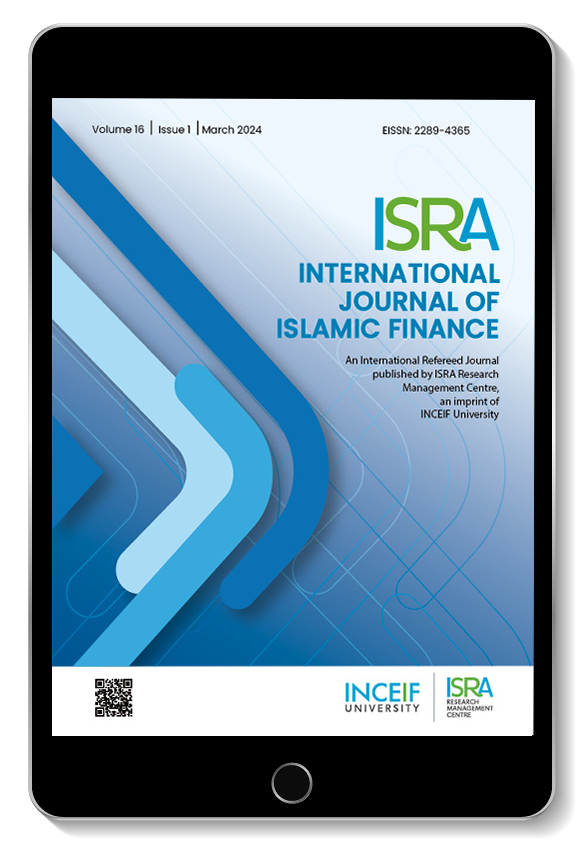A bibliometric analysis of quality research papers in Islamic finance: evidence from Web of Science
IF 1.4
Q2 BUSINESS, FINANCE
引用次数: 26
Abstract
Purpose The purpose of this study is to provide quantitative information on the growth of Islamic finance literature. The study focused on publishing trends, countries producing research on Islamic finance, key authors, major contributing organizations, authorship patterns, keywords and articles with the highest citations. Design/methodology/approach Bibliometric analysis is applied to analyse the growth and publishing trends in Islamic finance literature. The Web of Science (WoS) database was used to extract bibliometric data covering the period 1939–2019 for Islamic finance literature. Findings The study finds that Islamic finance research has gained remarkable momentum in the literature. However, such growth is largely manifested in Malaysia because of a conducive atmosphere for this type of research. Interestingly, the study finds that the three most productive journals are located in the UK and Malaysia, while Professor M. Kabir Hassan from the University of New Orleans, the USA appears to head the list of authors with 23 publications on Islamic finance. Practical implications This study provides up-to-date literature on the current state of Islamic finance in the world; as a result, it supports the development of policies by the Islamic finance industry. The findings of the study also serve as a reference point for Islamic finance training and educational institutions. Originality/value Islamic finance is an emerging financial discipline; as such, there is a need for more awareness of this financial system in the world. Muslim-majority countries, especially Saudi Arabia, Turkey, Indonesia, the United Arab Emirates (UAE), Pakistan and Bahrain, have to include Islamic finance in their curriculum and establish research institutions and research journals. In addition, Arabic language journals should be indexed in WoS and/or Scopus to provide a high-quality publication platform. This study provides a more comprehensive bibliometric analysis on the growth of Islamic finance literature (1939–2019) in the WoS database; most of the prior studies have covered relatively few areas of focus and a lower range of years in some cases.伊斯兰金融研究论文质量的文献计量分析:来自Web of Science的证据
目的本研究的目的是为伊斯兰金融文献的发展提供定量信息。这项研究的重点是出版趋势、从事伊斯兰金融研究的国家、主要作者、主要贡献机构、作者模式、关键词和引用率最高的文章。设计/方法/方法文献计量分析应用于分析伊斯兰金融文献的增长和出版趋势。使用Web of Science (WoS)数据库提取1939-2019年期间伊斯兰金融文献的文献计量数据。研究发现,伊斯兰金融研究在文献中获得了显著的发展势头。然而,这种增长主要体现在马来西亚,因为这类研究的有利环境。有趣的是,该研究发现,产出最高的三种期刊位于英国和马来西亚,而美国新奥尔良大学的M. Kabir Hassan教授似乎以23篇关于伊斯兰金融的文章位居作者名单之首。本研究提供了关于世界伊斯兰金融现状的最新文献;因此,它支持伊斯兰金融业制定政策。研究结果也可作为伊斯兰金融培训和教育机构的参考点。伊斯兰金融是一门新兴的金融学科;因此,全球有必要提高对这一金融体系的认识。穆斯林占多数的国家,特别是沙特阿拉伯、土耳其、印度尼西亚、阿拉伯联合酋长国、巴基斯坦和巴林,必须将伊斯兰金融纳入其课程,并建立研究机构和研究期刊。此外,阿拉伯语期刊应在WoS和/或Scopus中编入索引,以提供高质量的出版平台。本研究对WoS数据库中伊斯兰金融文献(1939-2019)的增长进行了更全面的文献计量分析;大多数先前的研究涵盖了相对较少的重点领域,在某些情况下,时间范围较短。
本文章由计算机程序翻译,如有差异,请以英文原文为准。
求助全文
约1分钟内获得全文
求助全文
来源期刊

ISRA International Journal of Islamic Finance
BUSINESS, FINANCE-
CiteScore
3.40
自引率
17.40%
发文量
18
审稿时长
20 weeks
期刊介绍:
It is the aspiration of the editorial committee that IJIF achieves the highest rank in quality and substance. It is thus our aim that the journal be carried in the Thompson Reuters’ ISI and Scopus databases. By ensuring high standards in articles published in Islamic finance we ensure that further innovation and research is carried out and promoted in the Islamic finance industry and academia. IJIF publishes 2 issues per annum.
 求助内容:
求助内容: 应助结果提醒方式:
应助结果提醒方式:


